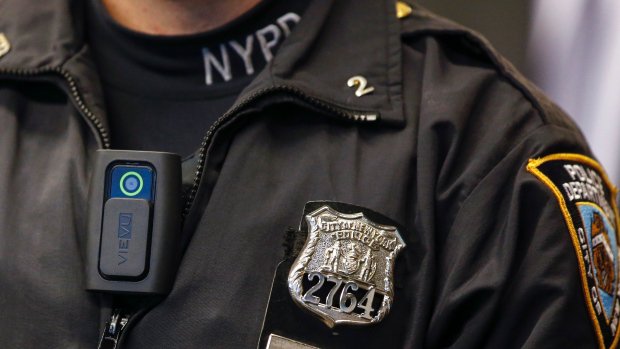
The New York Police Department is one of several law enforcement agencies in the U.S., Canada, and the U.K. experimenting with body-worn cameras, pictured on an officer’s uniform here.
Police in Calgary, Vancouver, and Toronto have all said they will adopt or try out the technology. Canada’s privacy commissioners are flagging a host of privacy issues that have arisen as more and more police forces consider attaching video cameras to their officers’ uniforms.
There is some evidence that use of body-worn cameras by police reduces both complaints against police and the use of force by front-line officers.
The cameras have also been publicly recommended after high-profile incidents in which police shot to death teenagers in Toronto and in Ferguson, Mo., last year.
Some police forces in Canada have already tested or are testing the technology, including Calgary, Edmonton, and Toronto, which is launching a pilot test this month.
However, the use of body-worn cameras means police capture a lot of video and audio of their interactions with the public – mostly identifiable individuals.
That means they contain personal information, and must comply with Canadian privacy laws governing the protection of personal information, the federal, provincial, and territorial privacy commissioners warn in a new document recently released.
The document is designed to help law enforcement agencies develop policies and procedures governing the use of body-worn cameras.
“There are clearly benefits to the use of body-worn cameras, however, there are also significant privacy implications,” said Daniel Therrien, privacy commissioner of Canada, in a statement. “Given this, and as more and more policing organizations consider adopting this technology, we are encouraging them to address those privacy issues upfront to ensure they strike the right balance between law enforcement needs and the privacy rights of Canadians.?
Anne Bertrand, access to information and privacy commissioner of New Brunswick, said in a statement that she expects the use of body cameras by police “will quickly become the norm in Canada.”
The document urges police forces to evaluate whether the expected benefits of body cameras will outweigh the potential privacy implications before launching their own programs.
The document also flags a number of issues to consider when deciding how the cameras will be used, such as whether images will be recorded continuously or only when activated. The advantage of continuous recording is that officers can’t be accused of manipulating recordings for their own benefit, the document acknowledges.
“However, from a privacy perspective, collecting less or no personal information is always the preferred option,” it adds, suggesting that it will be difficult for police forces to justify continuous recording.
In the case of intermittent recording, strict guidelines should state the circumstances for turning the cameras on and off and whether that should be done by the officer wearing the camera or remotely by someone else.
It also recommends considerations and best practices for police forces that choose to use the technology, such as:
- Requiring officers to make a short statement or wear a prominent pin or sticker to notify the public of the camera during encounters.
- Safeguarding the recordings with encryption and restricted access, and by deleting the data after a specified length of time.
- Blurring the faces of bystanders when images are shared with the public for the purpose of identifying someone.
- Using “further scrutiny and care” before analyzing the data with technology such as facial recognition software or licence plate recognition that could raise additional privacy concerns.
- Having strict privacy protection guidelines for recordings used for a “secondary purpose” such as officer training or research. For example, recordings with “sensitive content” should be excluded.
“We have discussed the guidelines with law enforcement experts and are confident that our guidance is reasonable and has appropriately considered operational issues,” said Valerie Lawton, spokeswoman for the Office of the Privacy Commissioner of Canada, in an email.
Source: www.cbc.ca
